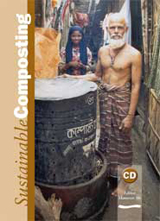
My WEDC
Gateway to managing your resources and events
Water Engineering and Development Centre

Author(s): Ali, Mansoor (ed) | Harper, Malcolm | Pervez, Anjum | Rouse, Jonathan | Drescher, Silke | Zurbrugg, Chris
Publisher: WEDC
Collection(s): Solid waste management | WEDC Bookshop
Price: £19.95
ISBN: 9781843800767
Composting is a process of converting organic waste into humus. Humus is inert, so it can be used as a soil conditioner or as landfill cover. In low-income countries, inorganic waste such as metals and glass is often recycled by the informal sector, while non-governmental organizations and the private sector take a lead in recycling organic waste through composting. Nevertheless, organic waste and other value-less waste remains a major problem.
This publication presents the findings from the DFID-funded research project 'Promoting Compost as a Business for the Urban Poor' in the form of guidelines developed from case studies. The guidelines are helpful for planning and managing compost projects for creating sustainable employment for the urban poor.
Keywords:
Bangladesh | Case studies | Composting | Dhaka | India | Lahore | Marketing | Pakistan | Solid waste management | Sri Lanka